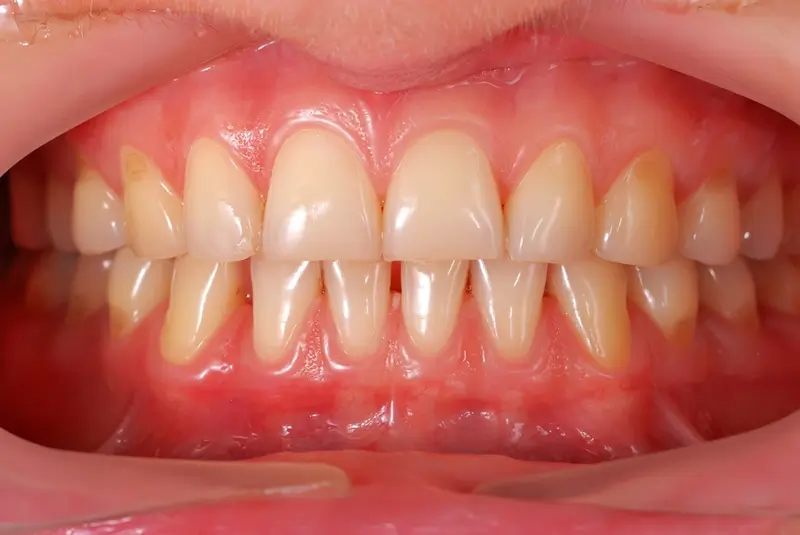Gingivitis is an early form of gum disease that's caused when plaque is allowed to build up and cause irritation. Often attributed to poor oral hygiene, untreated gingivitis can lead to periodontitis – a more serious form of gum disease that can cause tooth loss if not properly treated.
Understanding the causes of gingivitis
Bacteria causes inflammation and irritation around the edge of the gums and teeth.
Gingivitis is the result of bacteria being allowed to develop into plaque and cause problems for our gums. Plaque is the sticky substance that naturally forms over teeth and is produced when the bacteria that lives in the mouth combines with the sugars and starches in foods to create the sticky, invisible layer. As the bacteria is always present in your mouth, plaque is continuously forming and so needs to be removed every day with regular flossing and brushing.
When left to harden, plaque turns into tartar, which provides more room for bacteria to grow and must be removed by a dental professional.
Both plaque and tartar can effect the health of teeth and gums. Plaque contributes to excess acids on the teeth, which can lead to the wearing away of enamel and also dental caries. With the gums, the excess bacteria causes inflammation and irritation around the edge of the gums and teeth, resulting in gingivitis.

Identifying the signs of gingivitis
One of the key indicators of gingivitis is the appearance and comfort of your gums. Healthy gums are pink and without soreness. When gums are inflamed due to infection, they're extra sensitive and so a number of symptoms may start to appear, such as:
- Swollen, red gums.
- Bleeding gums when brushing or flossing.
- Bad breath.
- Other changes to the look or comfort of your gums.
In extreme cases you may notice that the gums recede, or begin to pull away from the teeth. This can cause further issues in that it creates a space for food and debris to collect, where bacteria can thrive.
Preventing gum disease
Good oral hygiene is the first step in preventing gingivitis from taking hold, or allowing it to eventually develop into periodontitis – the more advanced form of gum disease. Both brushing and flossing work to remove bacteria and plaque buildup, and maintain your oral health.
Your diet and lifestyle also play a part. Choosing healthy foods and drinks such as water and vegetables prevents excess sugar in the mouth, which combines with bacteria to produce plaque.
Visit your dentist for regular checkups so that they can look for early signs of gum disease.
It's also important to visit your dentist for regular checkups, so that they can look for early signs of gum disease that are not always obvious to the naked eye. At checkups, your dentist can professionally clean your teeth to reduce plaque buildup, and properly remove tartar – the hardened form of plaque. They'll also let you know the condition of your teeth and if you need to pay closer attention to your at-home routine. Should you have any restorations, your dentist will also check these fit properly, as gaps can provide a breeding ground for bacteria.
Certain medications and conditions can contribute to gingivitis, so informing your dentist of any changes to your health can help them to provide the best advice around how to care for your teeth. Many other factors impact the state of your teeth, such as age, pregnancy or hormonal changes, and you should always let your dentist know of anything significant.
In rare cases, untreated the disease can develop into acute necrotising ulcerative gingivitis (ANUG) which presents more severe instances of the symptoms above, as well as ulcers, difficulty swallowing, excess saliva and a high temperature.
If gingivitis develops into periodontitis the gums may pull away from the teeth, and it may also affect the surrounding tissue and bone, causing teeth to loosen and potentially fall out.

Treating gum disease
How your dentist treats gingivitis depends on how developed it is. In the early stages of gingivitis, you may be able to treat it by improving your oral hygiene at home, or with some assistance from your dental professional. You should:
- Brush and floss twice a day – with particular care after meals to remove any food debris.
- Use approved toothpastes and mouthwashes to ensure the overall health of your mouth.
- Consider your diet, and remove particularly sugary items.
- Adopt a healthy lifestyle, such as quitting smoking.
- Visit your dentist regularly for checkups.
Should the disease be further developed, your dentist may help by offering professional cleaning to clear any buildup of plaque or tartar. They'll also provide some tips and advice for maintaining your oral health going forward.
Should periodontitis be a concern, your dentist may talk to you about more significant treatments.
If you have any questions about your oral health, make an appointment online or call 04 978 4964 today.
